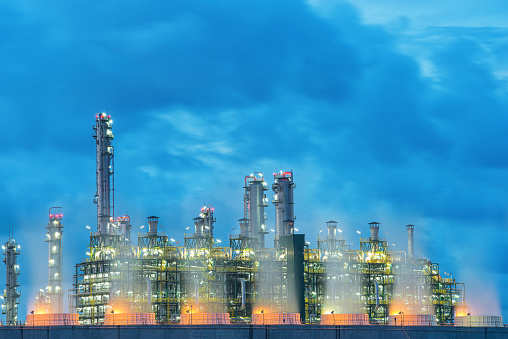“For the first time in the history of the world, three public-sector companies have come together to develop the world’s largest green field refinery at the cost of Rs 3 lakh crore. This is going to help India to influence the ever-changing market dynamics in the oil industry and we hope to drive international markets to become more competitive for the benefit of our citizens and our neighbours,” Dharmendra Pradhan said while talking at the JV signing agreement in Delhi.
 New Delhi: The three heavy-weights of the Indian downstream sector -- Indian Oil Corporation (IOC), Hindustan Petroleum Corp (HPCL) and Bharat Petroleum (BPCL)
– on Wednesday signed a Joint Venture (JV) agreement to create the
world’s largest refinery-cum petrochemicals complex at Babulwadi, Taluka
Rajpur in Ratnagiri district at the cost of $40 bn and a refining
capacity of 60 million tonne per annum (MMTPA).
New Delhi: The three heavy-weights of the Indian downstream sector -- Indian Oil Corporation (IOC), Hindustan Petroleum Corp (HPCL) and Bharat Petroleum (BPCL)
– on Wednesday signed a Joint Venture (JV) agreement to create the
world’s largest refinery-cum petrochemicals complex at Babulwadi, Taluka
Rajpur in Ratnagiri district at the cost of $40 bn and a refining
capacity of 60 million tonne per annum (MMTPA).The signing of the Joint Venture agreement took place in the presence of Dharmendra Pradhan, Minister of Petroleum and Natural Gas. Speaking at the event the oil minister drew parallels of the growth of steel industry in China and how the country was able to dictate pricing of raw materials and steel products due to its capacity.
“For the first time in the history of the world, three public-sector companies have come together to develop the world’s largest green field refinery at the cost of Rs 3 lakh crore. This is going to help India to influence the ever-changing market dynamics in the oil industry and we hope to drive international markets to become more competitive for the benefit of our citizens and our neighbours,” Dharmendra Pradhan said while talking at the JV signing agreement in Delhi.
He added that viability of other associated industries in the vicinity of the mega west coast project is also being examined so that job creation and allied industries get a boost.
According to company officials, the refinery-cum petrochemicals complex is designed to produce Euro-IV and above grade transportation fuels, the refinery will have in-built flexibility for processing a wide spectrum of light and heavy crude oil grades, utilising various blending techniques.
The company officials add that it will also be able to produce on-demand product mix of petrol and diesel streams, as well as other refined products and petrochemical streams with the highest level of integration and energy efficiency.
Sanjiv Singh, Chairman at IOC, the country’s largest fuel retailer and the majority partner at the west coast refinery, told reporters at the sidelines of the event that all the three fuel retailers are contemplating whether to construct the whole of the 60 million tonne per annum in one go or in phases.
According to the Memorandum of Understanding, Phase-1 of the project will cost between Rs 1.2 lakh crore and Rs 1.5 lakh crore. It is expected to come up in 5-6 years from the date of land acquisition. The first phase will be a 40 mt unit with an aromatic complex, naphtha cracker and polymer complex. Phase-2 of the project is expected to cost approximately Rs 50,000 crore to Rs 60,000 crore.
However, Sanjiv Singh told reporters that the actual cost of setting up the refinery is still being discussed and it may stand at around Rs 2.5 lakh crore with an increase or decrease of 50,000 crore.
Singh said that international oil and gas players have shown interest in buying stake in the upcoming refinery and preliminary talks have already begun with Saudi Aramco.
He added that the three fuel retailers are open to the concept of having strategic partners but the partner cannot be a majority stakeholder in the project. Based on the terms of the MOU already signed between the three OMCs, IOC will hold 50 per cent stake in the refinery complex while HPCL and BPCL will hold 25 per cent each.
The preliminary configuration study of the project is being carried out by Engineers India Limited (EIL) along with international consultant IHS, which will conduct the market study for the chemicals and petrochemicals to be produced at the complex.
India has been struggling to increase its domestic production of crude oil and natural gas. The country has also been positioning itself to become the refining hub of the world.
The country currently has the fourth-largest refining capacity in the world and the planned west coast refinery will propel India’s capacity to 294.5 MMTPA from 234.5 MMTPA currently.

No comments:
Post a Comment